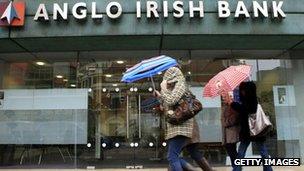Anglo Irish Bank debt deal gets ECB clearance
- Published

Anglo Irish Bank, along with most of the Irish banking sector, collapsed after the 2008 financial crisis
The European Central Bank has cleared a deal to liquidate the former Anglo Irish Bank, the Republic of Ireland's Prime Minister has said.
"Today's outcome is a historic step on the road to economic recovery," Enda Kenny told the Irish parliament.
The Dail passed emergency legislation overnight for the deal, which lets Ireland defer by decades the bill for its most controversial bank bailout.
Anglo Irish, now called IBRC, was nationalised in January 2009.
'More manageable'
Under the plan, the debt taken on by Dublin to finance Anglo Irish's rescue will be swapped for long-term government bonds.
The original debt was set to cost Irish taxpayers 3.1bn euros (£2.6bn) each year for the next 10 years, with the next payment this March.
Under the replacement bonds, repayment of the debt will not now begin until 2038, and will not be complete until 2053.
The interest rate on the new debt has also been cut to 3%, compared with 8% on the old debt.
However, the full details of the new debts are not available, so it is unclear exactly how much money the government might stand to save.
Finance Minister Michael Noonan said that inflation over the coming decades would make the replacement debts much more manageable once they come up for repayment.
By deferring the debt repayments, it also means the the government's deficit - its annual borrowing requirement - will be 2bn euros per year less than it would have been over the coming 10 years.
'Very special case'
The Irish parliament stayed up into the early hours of Thursday morning in order to pass the legislation enacting IBRC's dissolution.
The lower house of the Irish parliament voted through the legislation by 113 to 36.
It came after a stormy session in which the plans were attacked for their swift timeframe and lack of detail.
The leader of the Socialist Party, Joe Higgins, said the introduction had been "chaotic".
Mr Kenny said the disappearance of Anglo Irish Bank and the Irish Nationwide Building Society, which is also held by IBRC, from the Irish financial landscape was "long overdue" and that without banking costs, Ireland's debt levels would now be below Germany's.
The late sitting was needed in order to have the new law in place before the European Central Bank completed its regular board meeting on Thursday.
The Republic of Ireland's central bank governor, Patrick Honohan, had been negotiating the plan with the ECB late on Wednesday, when details leaked to the press.
The ECB President, Mario Draghi, said at his regular monetary policy press conference on Thursday afternoon that the board had unanimously "noted" the deal, but said it was a matter between the Irish government and central bank.
However, the ECB had the power to veto the agreement.
It comes at the end of 18 months of negotiations during which the ECB is said to have resisted any move that set a precedent for other eurozone governments facing large bills for rescuing their banks, notably Spain.
Mr Honohan said on Thursday that the deal should not be interpreted as such a precedent. "It is a very special case," he said.
Toxic loan book
IBRC's board was dismissed on Wednesday and the accountants KPMG are now running the bank.
Its loans will be transferred to the National Asset Management Agency (Nama), the Irish "bad bank" responsible for recovering the value of problematic loans made by other Irish banks.
The IBRC has been winding down the old toxic loan book of Anglo Irish for more than two years.
The Irish government issued the total 31bn-euro promissory note in order to cover most of the 34bn-euro cost of rescuing Anglo Irish.
The bank, which still employs almost 800 people, was among the most prolific of lenders to property speculators and developers during the Irish Republic's housing bubble in the last decade.
Liquidation would mean all these workers would lose their jobs, although the government said the majority of these are expected to be rehired by Nama.
- Published30 January 2013
- Published29 November 2012